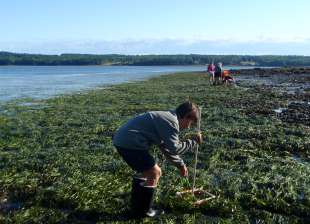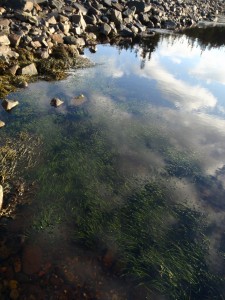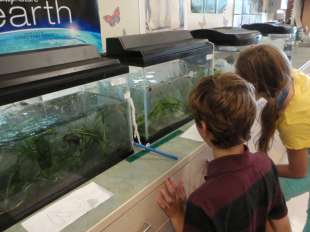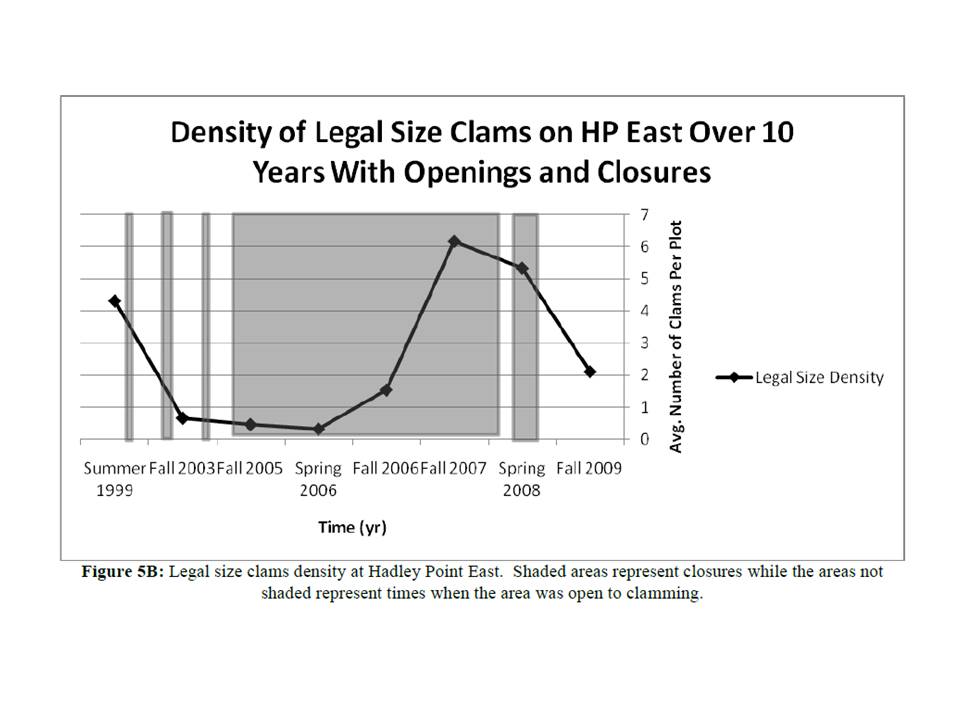 Mount Desert Island Biological Laboratory (MDIBL) is working to restore eelgrass habitat that serves as essential nursery areas for commercially important marine species in the Gulf of Maine. Eelgrass (Zostera marina) is a unique flowering plant, formerly occurring in widespread meadows in sub-tidal areas along many coastlines in the Northern Hemisphere. As one of the primary photosynthetic producers, and as nursery habitat for many species, it plays a crucial role in the ecology of the Gulf of Maine. In Frenchman Bay, eelgrass has recently experienced significant declines, possibly related to dragging for mussels and other sessile species.
Mount Desert Island Biological Laboratory (MDIBL) is working to restore eelgrass habitat that serves as essential nursery areas for commercially important marine species in the Gulf of Maine. Eelgrass (Zostera marina) is a unique flowering plant, formerly occurring in widespread meadows in sub-tidal areas along many coastlines in the Northern Hemisphere. As one of the primary photosynthetic producers, and as nursery habitat for many species, it plays a crucial role in the ecology of the Gulf of Maine. In Frenchman Bay, eelgrass has recently experienced significant declines, possibly related to dragging for mussels and other sessile species.
 At Hadley Point in upper Frenchman Bay, the bottom coverage was estimated at 60 – 80% cover in 1996, declining to <0.5% by 2007. Over the last four summers, MDIBL has worked in partnership with multiple community groups to restore eelgrass at Hadley Point. Efforts to date have had demonstrable success. The coverage in the restoration reserve has increased from a low of 0.5% in 2007 to approximately 15% in 2011. Moreover, while 74 square meters of eelgrass had been transplanted over the past 5 summers, a recent census revealed 3500 square meters of coverage, nearly a 48-fold increase. In addition, new eelgrass beds have developed in nearby areas of the bay. Current tracking data suggest that seed is travelling from the restoration area to new eelgrass sites around the bay. Juvenile mussels are the predominant marine organism inhabiting eelgrass blades in the restoration area during the summer months. Future plans include optimizing eelgrass restoration methods and expanding eelgrass restoration efforts around Frenchman Bay with funding from Constellation Energy.
At Hadley Point in upper Frenchman Bay, the bottom coverage was estimated at 60 – 80% cover in 1996, declining to <0.5% by 2007. Over the last four summers, MDIBL has worked in partnership with multiple community groups to restore eelgrass at Hadley Point. Efforts to date have had demonstrable success. The coverage in the restoration reserve has increased from a low of 0.5% in 2007 to approximately 15% in 2011. Moreover, while 74 square meters of eelgrass had been transplanted over the past 5 summers, a recent census revealed 3500 square meters of coverage, nearly a 48-fold increase. In addition, new eelgrass beds have developed in nearby areas of the bay. Current tracking data suggest that seed is travelling from the restoration area to new eelgrass sites around the bay. Juvenile mussels are the predominant marine organism inhabiting eelgrass blades in the restoration area during the summer months. Future plans include optimizing eelgrass restoration methods and expanding eelgrass restoration efforts around Frenchman Bay with funding from Constellation Energy.


 Most of the available clam resource in Bar Harbor is at Hadley Point and in Thomas Bay. Clam harvests are regulated by the town which has an ordinance. There are conservation areas on the east and west side of Hadley Point. Both areas have been closed in the past for conservation, but are currently open for harvesting. The Bar Harbor Marine Resources Committee, in partnership with College of the Atlantic and MDI High School, has been active in conducting clam surveys. The last survey of the east side in fall 2009 revealed a peak of one inch clams. Two inch clams are the legal size for harvest. The resource on the east side of Hadley Point is generally larger than on the west side. The amount of spat recruitment is variable from year to year and probably does more to influence population size than conservation closures. In terms of conservation closures, the Bar Harbor Marine Resources Committee has learned that 6 month closures are ineffective. Two year closures will enable populations to re-bound, but given the current intensity of clamming, the positive effect of the closure is not long-lived.
Most of the available clam resource in Bar Harbor is at Hadley Point and in Thomas Bay. Clam harvests are regulated by the town which has an ordinance. There are conservation areas on the east and west side of Hadley Point. Both areas have been closed in the past for conservation, but are currently open for harvesting. The Bar Harbor Marine Resources Committee, in partnership with College of the Atlantic and MDI High School, has been active in conducting clam surveys. The last survey of the east side in fall 2009 revealed a peak of one inch clams. Two inch clams are the legal size for harvest. The resource on the east side of Hadley Point is generally larger than on the west side. The amount of spat recruitment is variable from year to year and probably does more to influence population size than conservation closures. In terms of conservation closures, the Bar Harbor Marine Resources Committee has learned that 6 month closures are ineffective. Two year closures will enable populations to re-bound, but given the current intensity of clamming, the positive effect of the closure is not long-lived.
